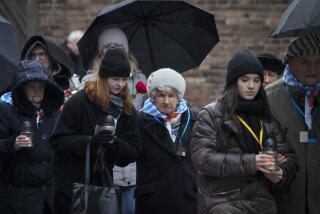50 Years After Devastating Raid, a Healing in Dresden : World War II: British, U.S. representatives lay wreaths for the dead. German president underlines Nazi guilt.
- Share via
DRESDEN, Germany — British, American and German representatives laid wreaths Monday in a gesture of reconciliation 50 years after Allied bombers devastated the city of Dresden in one of the heaviest attacks of World War II.
Up to 35,000 civilians died in the raid on Feb. 13 and 14, 1945, which turned the famed baroque center of Dresden into a roaring furnace but left military targets almost unscathed.
But German President Roman Herzog told his countrymen that not even such an attack could lessen the Nazis’ crimes.
“No one present in this room intends to indict anyone or expects anyone to show remorse or indulge in self-accusation. No one wants to offset the atrocities committed by Germans in the Nazi state against anything else,” he said in a speech at the main anniversary commemoration.
The Duke of Kent, representing Britain’s Queen Elizabeth II, joined the top military commanders of Britain, the United States and Germany to lay wreaths in a silent ceremony before a memorial stone at the woodland Heidefriedhof cemetery.
The duke presented plans for a symbolic gold cross that British donors, including the government and the queen, are presenting to adorn the dome of Dresden’s famous baroque Church of Our Lady.
The church was once Dresden’s most cherished landmark. For 50 years, it was left a bombed-out ruin to serve as a reminder of the horrors of war, but now it is to be rebuilt as the most potent symbol of Dresden’s rise from the ashes.
The gift and the duke’s presence are doubly significant following a controversial visit by the queen in 1992, just after the Queen Mother unveiled a statue to the raid’s mastermind, Sir Arthur Harris, wartime head of Britain’s bomber command.
Dresdeners had not expected the British monarch to apologize for the raid, as no British government had ever done so.
But some booed after she failed to stop at the church, making forgiveness difficult for Dresdeners who had still seen Britain portrayed as an ideological enemy during postwar Communist rule in East Germany.
Monday, Herzog said it was pointless to argue over which side caused the most suffering.
“Where does that take us, given the 50 years that have passed since then and the painful recognition that the international order is even today virtually powerless against war and mass murder?” he said.
More to Read
Sign up for Essential California
The most important California stories and recommendations in your inbox every morning.
You may occasionally receive promotional content from the Los Angeles Times.













